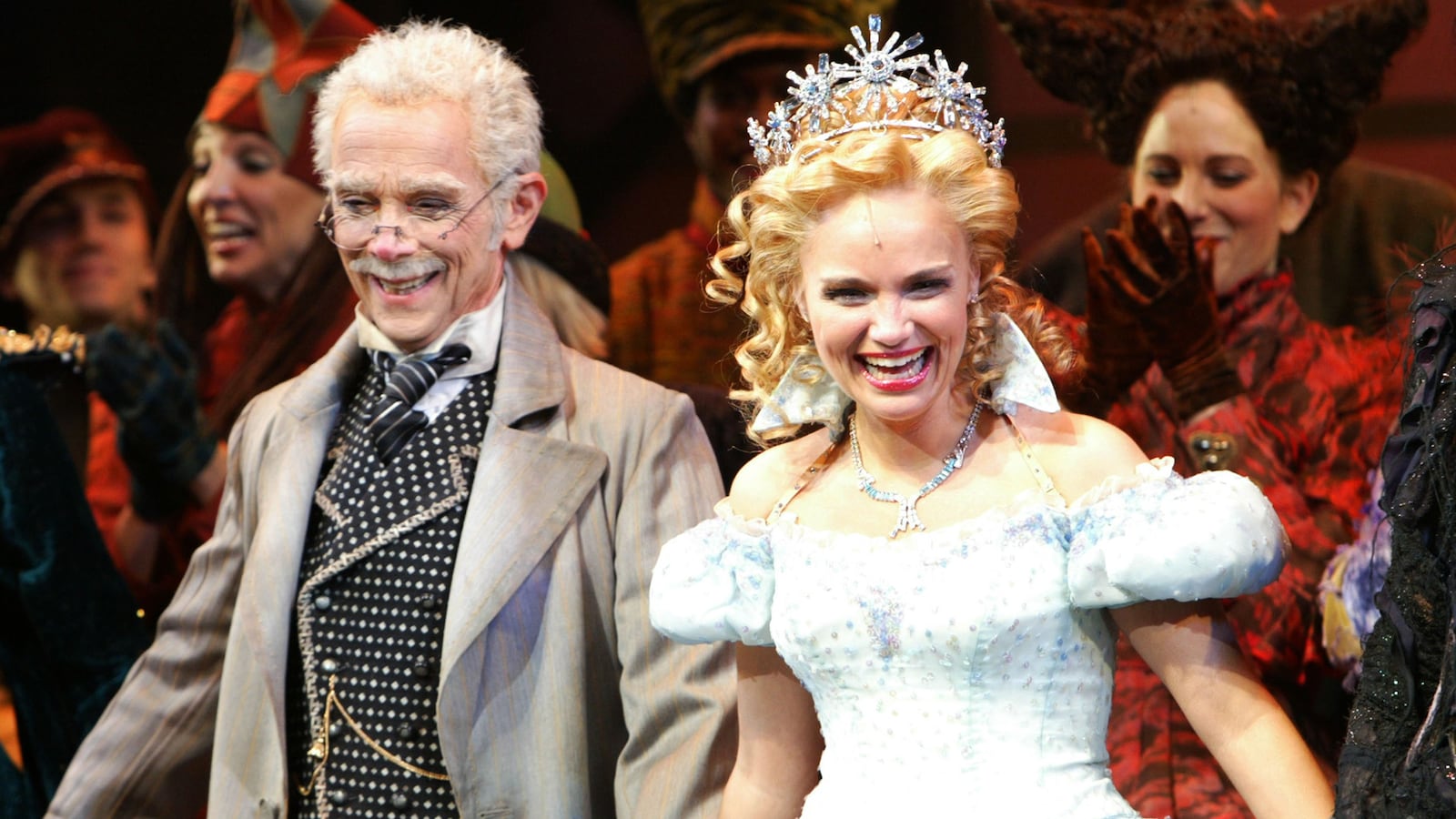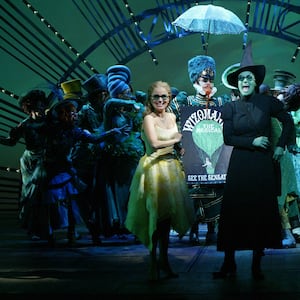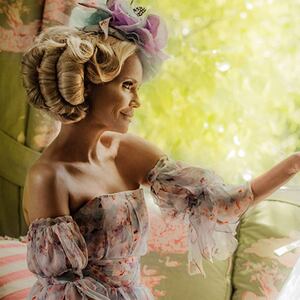Kristin Chenoweth walks into a room of reporters waiting to interview her about the 15th anniversary of Wicked. She beams. “It’s good to see me, isn’t it?”
“I couldn’t help myself,” she giggles after reviving the opening line she delivered night after night—while suspended from the rafters in a floating bubble—during her nine-month run as Glinda in Wicked’s original Broadway cast. “It’s the best opening I’ve ever been given.”
Chenoweth, along with the Elphaba to her Glinda, Idina Menzel, will host and perform in Monday night’s NBC concert special, A Very Wicked Halloween, in honor of the blockbuster musical’s major milestone.
The duo will perform the iconic numbers associated with their characters—“Popular” for Chenoweth, “Defying Gravity” for Menzel—as well as introduce performances from the likes of Pentatonix, Adam Lambert, Ledisi, and an ensemble of past and current Glindas and Elphabas. Ariana Grande, an avowed Wicked superfan, will sing “The Wizard and I,” taking the stage in her first professional appearance since announcing time off following ex-boyfriend Mac Miller’s death and the end of her engagement to Pete Davidson.
Proudly displaying her custom clutch, blindingly bedazzled in a pink design mimicking the art on the original Wicked marketing material, Chenoweth is the human version of just-popped champagne, her famously bubbly personality fizzing at the occasion to reflect on the defining role and project of the last 15 years of her career.
“I’ve actually been singing these songs for 17 years!” she clarifies, reminding us that she was part of the development and workshopping of the show, which was written with the Tony-winner in mind for Galinda/Glinda.
Composer and lyricist Stephen Schwartz (Godspell, Pippin) began developing Wicked, based on Gregory Maguire’s 1995 novel Wicked: The Life and Times of the Wicked Witch of the West, in 1998 after wresting the rights to an adaptation from Universal Pictures, which had planned on developing the book into a live-action feature film. Screenwriter Winnie Holzman (My So-Called Life, thirtysomething) came on board to pen the musical’s book.
The story is a reverse trip down the yellow brick road to before Dorothy ever landed in Oz, before there were tin men and skittish lions, and before the Wicked Witch of the West was ever wicked. It tells all the stories you never knew you wanted to know behind Oz’s smallest details. Why is the Wicked Witch green? When did the monkeys start flying? Just how long has Glinda been traveling by bubble? (Turns out, for a long time.)
It takes a narrative that everyone already knew backwards and forwards and spins it into a Technicolor new, odd, and occasionally wicked world—not unlike what a tornado does to one pigtailed young girl in the original book and film. Schwartz’s score, with songs like “For Good” and “Dancing Through Life” joining the aforementioned classics, would find its way from the Broadway stage to teenagers’ CD players across the country, one of just a handful of original cast recordings to become a pop-culture phenomenon.
Except that was never supposed to happen.
Wicked opened to terrible reviews in 2003. (When we mention this fact to members of Pentatonix at the Very Wicked Halloween press day, their eyes bulge. Kirstin Maldonado nears tumbles in her heels.)
An “overproduced, overblown, confusingly dark and laboriously ambitious jumble,” ruled Newsday. “The show’s twenty-two songs were written by Stephen Schwartz, and not one of them is memorable,” wrote The New Yorker. The New York Times ran perhaps the most damning review: “Wicked does not, alas, speak hopefully for the future of the Broadway musical.” At the Tony Awards that year, it lost Best Musical to Avenue Q.
Chenoweth remembers the reviews. But she also never doubted that the show would be a smash, telling Menzel following their first preview performance in San Francisco that, regardless of what critics were going to say, they had a hit on their hands, after hearing the roar of the crowd. The two performers would know. Chenoweth was already a Tony winner for her show-stopping turn in You’re a Good Man, Charlie Brown, while Menzel was in the original cast of Rent.
Fifteen years later, the show has grossed more than $1.2 billion, making it the second-highest grossing musical in Broadway history, and spawned tours and productions across the globe. The songs are a staple of both Chenoweth and Menzel’s concerts and tours—not to mention high school theatre audition rooms—and, Monday night, they’ll perform them together for only the second time since respectively leaving the show more than a decade ago.

Idina Menzel (left) shares a broom with her "Wicked" co-star and co-nominee Kristin Chenoweth at the 58th annual Tony Awards at Radio City Music Hall.
New York Daily News Archive/GettyThe songs have carried different meanings to Chenoweth as she’s performed them over the years and gone through different milestones in her life. “‘For Good’ has changed its meaning for me,” she says. “Watching people in your life go serve for your country. Watching people die. Watching people be born. That’s for good. It’s been 15 years. That’s my life. That’s a big part of my adult life.”
Menzel has shared similar sentiments, telling Billboard, “These are songs that grow and evolve with us as we get older—we don't become immune to needing to find our confidence and our self-esteem, there's always something in our life where we need to remind ourselves that we are enough.”
Chenoweth giggles scrolling through her favorite memories.
There was the time she was harnessed into the bubble and sent to the heavens, high above the stage, during rehearsals, but the cast and crew diverted to rehearse a different scene…and forgot about her. After fruitlessly yelling and screaming for their attention from her airborne perch, it wasn’t until she hooted an operatic high note than she was noticed. There was performing “For Good” each night and, of course, “Popular.”
“Popular” is her most indelible song, tailored to her unique skills. It’s a triumph of wordplay and melody, seizing on her opera-trained vocals and starburst stage presence for a physical comedy tour de force, one that has Glinda prancing, twirling, and leaping across stage while belting about “depressing creatures with unprepossessing features.”
She’s performed it in roughly a dozen languages, and reworked the lyrics in different performances over the years to make broader points, including, she says with an aggrieved sigh, “certain presidents and leaders.” (In her 2016 concert My Love Letter to Broadway, she performed the song as an indictment of Donald Trump.)
She adds the first time she heard “Popular” to the list of moments when she knew Wicked would be a hit even before it was staged. But she counts receiving another of Glinda’s songs from Schwartz, the Act II opener “Thank Goodness,” as her fondest memory of being a part of creating the show. The song was intimidating. It’s in three parts. It requires the singer’s full vocal and emotional range. The time signature changes. From a performance standpoint, it needs to be delivered with a gravitas signaling a maturation of the character of Glinda. “You can handle it,” Schwartz told her, dismissing any of her fears.
That song represented a personal journey Chenoweth herself had traversed. There was a certain catharsis in playing Glinda, a perky blonde who is underestimated, eventually proving her worth to everyone who undervalued her.
“I grew up speaking like a squeaky doll, and no one could see me,” she says, referencing her four-foot-eleven frame. “Literally no one saw that I was there. I think that’s why I’m a comedienne. I made up jokes, just tried to make people laugh. I think there’s a big part of me that really understood Glinda. I had to make an unlikable character likable. Then I had to make her good. I had the best help with my director, Joe Mantello. Thank god for him. Because I wanted that journey.”
The fact that six- and seven-year-old girls, kids who weren’t even alive when Chenoweth played Glinda on Broadway, come up to her with Wicked memorabilia after concerts speaks to the power of that journey. Inspired by this, Chenoweth launched an annual Broadway Bootcamp in 2015 in her home state of Oklahoma, which will expand this year, she says, “beyond my wildest dreams.”
Of course, the Wicked experience wasn’t all wands and bubbles. The show’s success pushed its leading ladies into the spotlight in ways they had never faced before. As is the unfortunate reflex when two women share that spotlight, there were tabloid rumors of backstage discord, which both actresses have repeatedly dismissed.
Talk of a rivalry exacerbated when each received a nomination for Best Actress in a Musical at the Tonys, which Menzel won. Chenoweth, who was already a Tony winner, has since said that she was rooting for Menzel to win that night.
“We were like sisters, together constantly,” Menzel told Entertainment Weekly in 2013. “Kristin and I have the ultimate, utmost respect for each other and admiration for what each of us can do. When you work together for a year and a half, you bite—I bite my husband’s head off nightly—but we were real advocates for each other and tried to protect each other and stand by each other.”
“We’re very different actors and we don’t see each other often, but that doesn’t mean there was drama,” Chenoweth told the magazine, echoing Menzel’s idea of the cast as a family again when we spaek. “Families got a lot of stuff going on. Happy, sad. We see each other every day. So we go through death, birth. All of it. But there’s something you can’t take away from a cast.”
Now that she’s had a chance to look back on the entirety of her Wicked experience and its legacy, we end by asking Chenoweth what, in hindsight, she thinks she learned about herself and that time in her career and in the public eye.
“That’s heavy,” she says. I would say to my younger self, ‘Put on your seatbelt. Buckle-up.’ Definitely trajectories have happened in my career overnight. Charlie Brown was a big moment. Pushing Daisies. Glee. There’s been moments, right? But Wicked is on its own. It’s a peak. It’s kind of hard to beat. But I’ll continue to try.”








